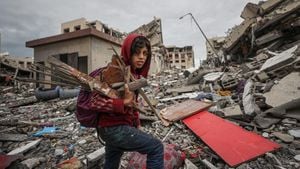On Saturday, November 23, 2024, Lebanon reported more than 55 fatalities resulting from Israeli air strikes, predominantly affecting the country's capital, Beirut. This surge of violence has brought renewed concern over the humanitarian crisis engulfing both Lebanon and Gaza amid rising tensions between Israel and Hezbollah.
According to the Lebanon Health Ministry, the air strikes included one particularly devastating attack on the working-class Basta neighborhood, which resulted in at least 20 deaths and left 66 individuals injured. Eyewitness accounts reveal the chaos and fear experienced by residents. "We saw two dead people on the ground... The children started crying and their mother cried even more," recalled Samir, a local resident, emphasizing the emotional toll on families.
The strikes were reportedly part of Israel's intensified military campaign targeting Hezbollah. Israeli military aircraft fired six missiles at the central Beirut location, bringing down residential buildings and causing widespread debris. A Lebanese security source indicated the strike was aimed at “a leading Hezbollah figure,” but this assertion was contested by the Iran-backed group’s lawmaker, Amin Sherri, who stated no official was present during the attack.
Following the strike on the city, additional bombardments occurred across southern suburbs of Beirut, prompting community evacuations, though many residents reported not receiving prior warnings from the Israeli military. The Israeli Defense Ministry confirmed it had targeted several Hezbollah command centers and weapons facilities throughout the region.
Meanwhile, the Lebanese health authorities have reported alarming figures related to the broader consequences of the conflict since October 2023, attributing over 3,670 deaths to clashes involving Israel and Hezbollah during this period. These figures also correlate with the onset of the war between Hamas and Israel, marking October 7, 2023, as the date of Hamas's unprecedented attack on Israel, which claimed the lives of 1,206 individuals, primarily civilians.
Shifting focus to the alarming situation within Gaza, it has recently been reported by the Hamas-run health ministry, with acknowledgment from the United Nations, indicating at least 44,176 deaths from Israeli air strikes and military actions within the area. These casualties predominantly involve innocents, deepening the existing humanitarian crisis.
On the same day of the Lebanese air strikes, around 19 casualties were reported from other regions, including Gaza, through pre-dawn strikes, and tank fire targeting housing areas, raising overall concerns for civilian safety as the humanitarian situation worsens.
A spokesperson from the Pentagon remarked on the urgency for facilitating discussions aimed at establishing peace and stability on both sides of the Israel-Lebanon border. The Pentagon chief Lloyd Austin reiterated the commitment of the United States toward supporting diplomatic resolutions. His comments come as he engaged with Israel’s Defense Minister, expressing hope for all civilians to return safely to their homes.
United States envoy Amos Hochstein has been mediatory between Israel and Lebanon, trying to broker peace talks. Earlier discussions had hinted at potential agreements; nevertheless, conflicting statements from both parties have led to skepticism about swift developments.
The website of the United Nations has repeatedly voiced concerns about the dire humanitarian conditions within Gaza as well. Tensions persist with over 100,000 individuals displaced since October, leading to diminishing availability of food, water, and medical supplies, showcasing the urgent need for international intervention.
Under grim circumstances, civilians remain trapped within war-torn areas, subject to strikes, where everyday life hangs by a thread, suffering emotional and physical consequences as violence escalates.
Such conditions have established the war not only as one of military clashes but also as one deeply affecting the psyche and survival of entire communities. Remaining crisis management effort from global players appears necessary to avoid complete humanitarian breakdown and provide relief to affected families.
This tumultuous backdrop only adds to the ever-growing complexity of the geopolitical situation surrounding Israel, Lebanon, and Palestine, leaving many hopeful but cautious as they await meaningful engagement and resolution.



